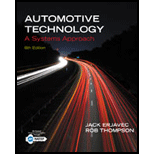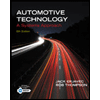
Automotive Technology: A Systems Approach (MindTap Course List)
6th Edition
ISBN: 9781133612315
Author: Jack Erjavec, Rob Thompson
Publisher: Cengage Learning
expand_more
expand_more
format_list_bulleted
Concept explainers
Textbook Question
Chapter 39, Problem 8ASRQ
During a test drive, a noise that appears to be transmission related disappears when the driver brings the vehicle to a stop and disengages the clutch with the engine at idle. Technician A says that the noise may be caused by an internal transmission problem. Technician B says that the problem may be something interfering with the flywheel or pressure plate. Who is correct?
a. Technician A only
b. Technician B only
c. Both A and B
d. Neither A nor B
Expert Solution & Answer
Want to see the full answer?
Check out a sample textbook solution
Students have asked these similar questions
When discussing the possible causes for a shudder during acceleration,
Technician A says that a worn inner CV joint could be the cause.
Technician B says that insufficient differential gear backlash could be the cause of the problem.
Who is correct?
O a. A only
O b. B only
O c. Both A and B
O d. Neither A nor B
A discussion concerning CV joint testing is being held.
Technician A says that a recommended method to check CV joints is to raise the vehícle so that the lower control arms are hanging freely; at this point the engine can be
accelerated while noise checks can be performed.
Technician B says that the vehicle should be road tested so that the CV joints can be checked under load.
Who is correct?
O a. A only
O b. B only
c. Both A and B
d. Neither A nor B
Technician A says that some systems use a special modulated shift control solenoid. Technician B says that some systems use a special modulated converter clutch control solenoid. Who is correct?
Technician A says that shift solenoids direct fluid flow to and away from the apply devices in the transmission. Technician B says that shift solenoids are used to mechanically apply a friction brake or multiple-disc clutch assembly. Who is correct?
Technician A says that throttle position is an important input in most electronic shift control systems. Technician B says that vehicle speed is an important input for most electronic shift control systems. Who is correct?
Technician A says that a faulty TP sensor can cause delayed shifts. Technician B says that delayed shifts can be caused by an open shift solenoid. Who is correct?
Technician A says that some shift solenoids can be activated by providing a ground for the solenoid. Technician B says that some shift solenoids can be activated by…
Chapter 39 Solutions
Automotive Technology: A Systems Approach (MindTap Course List)
Ch. 39 - After draining gear oil from a transaxie, the...Ch. 39 - Prob. 2RQCh. 39 - Prob. 3RQCh. 39 - What tool is often required to remove gears and...Ch. 39 - When removing or installing bearings, where should...Ch. 39 - List five common sources for transmission fluid...Ch. 39 - True or False? Bearing noise increases under load...Ch. 39 - A rough, growling noise that is heard from a...Ch. 39 - A clicking noise during transrnission/transaxle...Ch. 39 - Worn teeth on a speed gear can cause_______. a....
Ch. 39 - Using a lubricant that is thicker than the...Ch. 39 - What should you do to properly identify the type...Ch. 39 - Prob. 13RQCh. 39 - List at least five items that are typically...Ch. 39 - A poorly adjusted shift linkage can cause which of...Ch. 39 - Technician A says that the transmission rear seal...Ch. 39 - A noise occurs in forward and reverse gears but...Ch. 39 - A rough, growling noise occurs when a vehicle with...Ch. 39 - A car jumps out of gear into neutral, particularly...Ch. 39 - While diagnosing a noise from a transmission:...Ch. 39 - Technician A says that broken or worn engine and...Ch. 39 - While inspecting a transaxies gears: Technician A...Ch. 39 - During a test drive, a noise that appears to be...Ch. 39 - While inspecting the synchronizers of a transaxle:...Ch. 39 - Technician A says that the proper fluid level for...
Knowledge Booster
Learn more about
Need a deep-dive on the concept behind this application? Look no further. Learn more about this topic, mechanical-engineering and related others by exploring similar questions and additional content below.Similar questions
- While diagnosing a noise from a transmission: Technician A says that the noise is caused by something internal if it is most noticeable during a test drive. Technician B says that the noise is caused by the clutch if it disappears when the clutch is disengaged. Who is correct? a. Technician A only b. Technician B only c. Both A and B d. Neither A nor Barrow_forwardA car jumps out of gear into neutral, particularly when decelerating or going down hills: Technician A checks the shift lever and external gearshift linkage first. Technician B says that the clutch pilot bearing could be the problem. Who is correct? a. Technician A only b. Technician B only c. Both A and B d. Neither A nor Barrow_forwardTechnician A says that if the shift for all forward gears is delayed, a slipping forward clutch is normally indicated. Technician B says that a bad forward clutch is indicated when there is a slip when the transmission shifts into any forward gear. Who is correct? a. Technician A only b. Technician B only c. Both A and B d. Neither A nor Barrow_forward
- While discussing different abnormal clutch noises: Technician A says that pilot bushing noises are most noticeable in cold weather and usually occur when the pedal is being depressed and the transmission is in neutral. Technician B says that release bearing noise is most noticeable when the transmission is in neutral and occurs when the clutch pedal is depressed and stops when the pedal is fully released. Who is correct? a. Technician A only b. Technician B only c. Both A and B d. Neither A nor Barrow_forwardWhile discussing the purpose of a clutch pressure plate: Technician A says that the pressure plate assembly squeezes the clutch disc onto the flywheel. Technician B says that the pressure plate moves away from the clutch disc so that the disc can stop rotating. Who is correct? a. Technician A only b. Technician B only c. Both A and B d. Neither A nor Barrow_forwardTechnician A says that clutch slippage is most notice-able in higher gears. Technician B says that clutch slip page is not noticeable in lower gears. Who is correct? a. Technician A only b. Technician B only c. Both A and B d. Neither A nor Barrow_forward
- While discussing a pressure test: Technician A says that this test is the most valuable diagnostic check for slippage when a gear is engaged. Technician B says that the test can identify the cause of late or harsh shifting. Who is correct? a. Technician A only b. Technician B only c. Both A and B d. Neither A nor Barrow_forwardWhat is the purpose of a clutch in a vehicle transmission system?arrow_forwardtechnician a says that an oil-soaked clutch dis can cause clutch chatter technician b says that clutch chatter can be caused by the loose bell housing boltsarrow_forward
- List three possible causes of a noisy bearing during clutch operation.arrow_forwardA hot-wire MAF has low resistance across it when the wire is hot: Technician A says that this condition will cause the engine to stall as soon as you put the transmission into gear. Technician B says that this condition will cause the transmission to shift late. Who is correct?arrow_forwardTechnician A believes the stall test damages transmissions. This includes the torque converter clutch as well as other clutches and bands, says Technician B. Who is right? O Technician A Tech B, O O Neither technician A nor Barrow_forward
arrow_back_ios
SEE MORE QUESTIONS
arrow_forward_ios
Recommended textbooks for you
 Automotive Technology: A Systems Approach (MindTa...Mechanical EngineeringISBN:9781133612315Author:Jack Erjavec, Rob ThompsonPublisher:Cengage Learning
Automotive Technology: A Systems Approach (MindTa...Mechanical EngineeringISBN:9781133612315Author:Jack Erjavec, Rob ThompsonPublisher:Cengage Learning Automotive TechnologyMechanical EngineeringISBN:9781337794213Author:ERJAVEC, Jack.Publisher:Cengage,
Automotive TechnologyMechanical EngineeringISBN:9781337794213Author:ERJAVEC, Jack.Publisher:Cengage,

Automotive Technology: A Systems Approach (MindTa...
Mechanical Engineering
ISBN:9781133612315
Author:Jack Erjavec, Rob Thompson
Publisher:Cengage Learning

Automotive Technology
Mechanical Engineering
ISBN:9781337794213
Author:ERJAVEC, Jack.
Publisher:Cengage,
Mechanical Design (Machine Design) Clutches, Brakes and Flywheels Intro (S20 ME470 Class 15); Author: Professor Ted Diehl;https://www.youtube.com/watch?v=eMvbePrsT34;License: Standard Youtube License